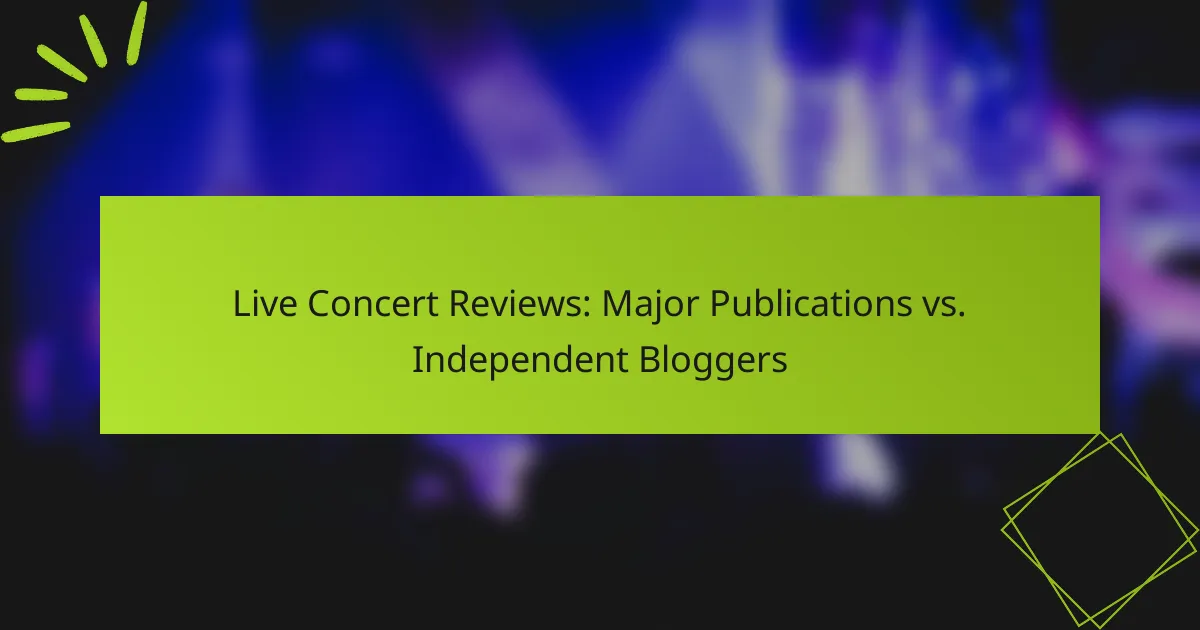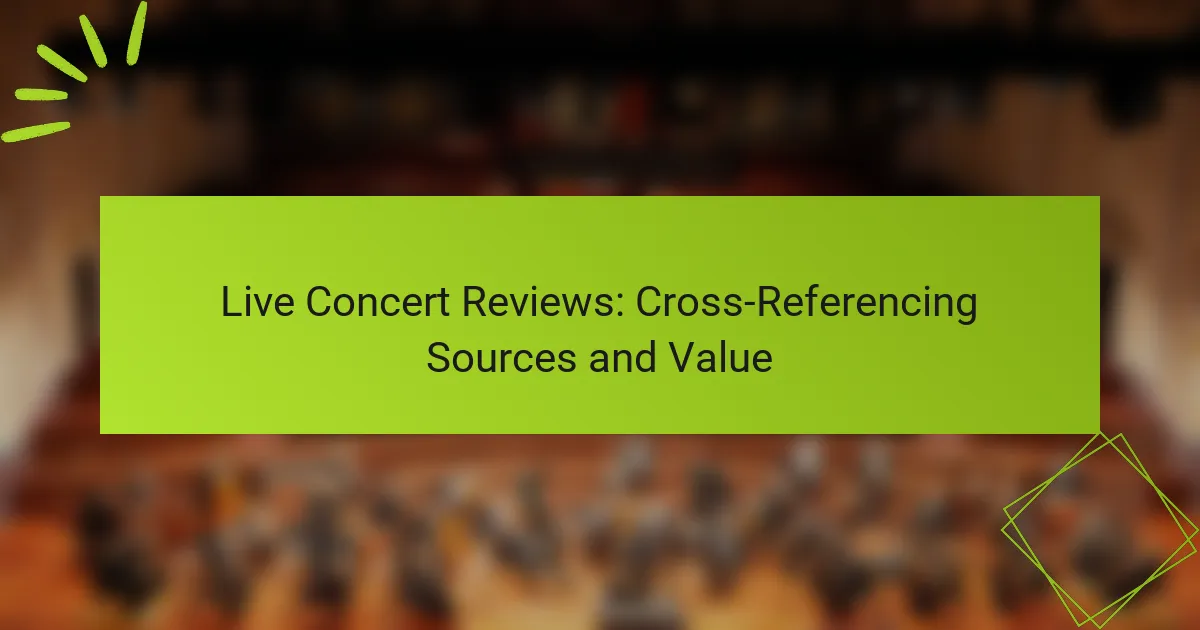Live concert reviews provide a fascinating glimpse into the world of music, with major publications and independent bloggers offering distinct perspectives. While major outlets emphasize professionalism and structured analysis, independent bloggers often share personal experiences that resonate on a more intimate level. This contrast highlights the diversity in concert coverage, catering to different audience preferences and expectations.
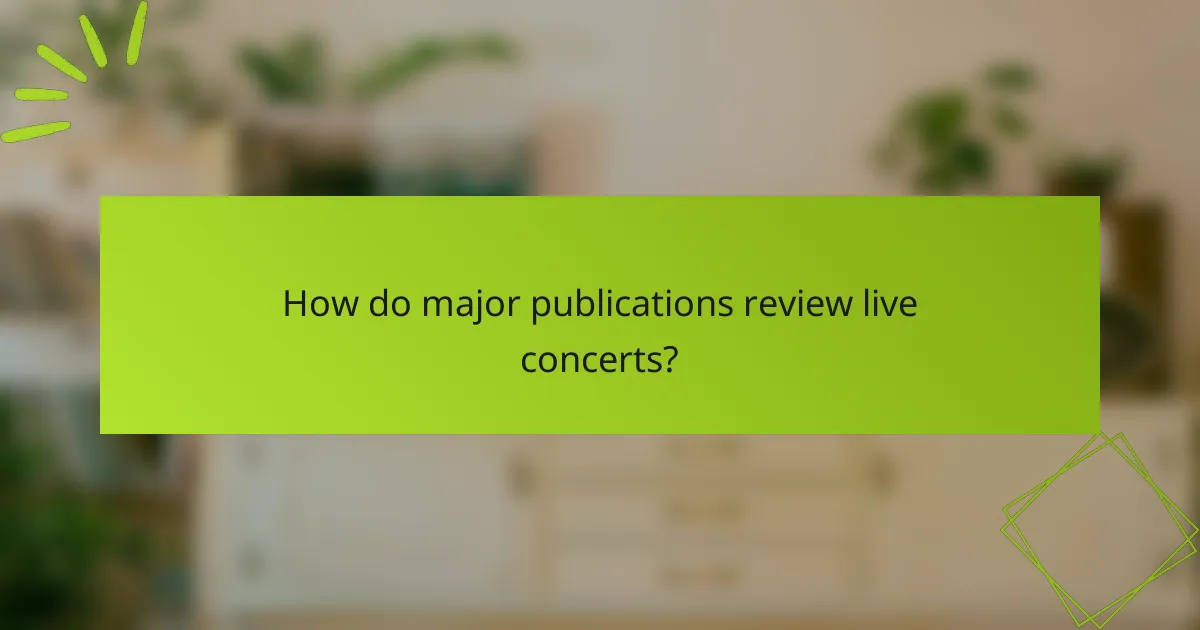
How do major publications review live concerts?
Major publications typically review live concerts through a structured approach that emphasizes professionalism and adherence to editorial guidelines. These reviews often focus on the performance quality, audience engagement, and overall experience, providing readers with a comprehensive perspective.
Professional standards and editorial guidelines
Major publications adhere to strict professional standards and editorial guidelines that shape their concert reviews. Reviewers are usually required to maintain objectivity, avoid conflicts of interest, and provide balanced critiques. This often involves a thorough analysis of the performance, including aspects like sound quality, stage presence, and setlist selection.
Additionally, many publications have established protocols for fact-checking and sourcing information, ensuring that the reviews are credible and reliable. Reviewers may also be expected to have a background in music journalism or a related field, which adds to the authority of their assessments.
Influence of audience demographics
Audience demographics play a significant role in how major publications approach concert reviews. Publications often consider the target audience’s preferences, cultural background, and age group when crafting their critiques. This can influence the language used, the aspects emphasized, and even the overall tone of the review.
For example, a review aimed at a younger audience might focus more on the energy of the performance and social media engagement, while one targeting an older demographic may highlight musical technique and historical context. Understanding the audience helps publications tailor their content effectively.
Examples of major publications
Prominent publications known for their concert reviews include Rolling Stone, Pitchfork, and The Guardian. Rolling Stone often emphasizes the cultural impact of performances and the artist’s legacy, while Pitchfork tends to focus on indie and alternative music scenes, providing in-depth analysis of emerging artists.
The Guardian offers a broad range of reviews across genres, often incorporating audience reactions and contextual information about the venue. Each of these publications has its unique style and focus, catering to different segments of the music-loving public.

How do independent bloggers review live concerts?
Independent bloggers review live concerts by sharing personal experiences and insights that resonate with their audiences. They often focus on authenticity and unique perspectives, which can differ significantly from mainstream publications.
Personal style and authenticity
Independent bloggers typically showcase a distinctive voice and style that reflects their individual tastes and preferences. This personal touch allows them to connect with readers on a deeper level, often sharing anecdotes and emotions that mainstream reviews may overlook.
Authenticity is key; bloggers often express genuine reactions to performances, which can include both praise and criticism. This honesty builds trust with their audience, as readers appreciate candid assessments rather than polished corporate narratives.
Engagement with niche audiences
Independent bloggers often cater to specific music genres or local scenes, creating content that resonates with dedicated fans. This niche focus allows them to cultivate a loyal following, as they provide insights that larger publications may not cover in depth.
By engaging with their audience through social media and comments, bloggers foster a community where fans can share their own experiences and opinions. This interaction enhances the overall concert review experience, making it more collaborative and inclusive.
Examples of notable independent bloggers
Several independent bloggers have gained recognition for their concert reviews, each bringing a unique perspective to the table. For instance, Blog Name 1 focuses on underground music scenes, while Blog Name 2 specializes in festival coverage.
These bloggers often leverage platforms like Instagram and YouTube to share live content, further expanding their reach and influence. Their reviews not only highlight performances but also capture the atmosphere and energy of the events, offering readers a comprehensive view of the concert experience.

What are the key differences between major publications and independent bloggers?
Major publications and independent bloggers differ significantly in their editorial processes, access to events, and monetization strategies. While major outlets often have established protocols and resources, independent bloggers can offer unique perspectives and flexibility in their coverage.
Editorial processes and fact-checking
Major publications typically follow rigorous editorial processes that include multiple layers of fact-checking and review. This ensures accuracy and adherence to journalistic standards, which can enhance credibility but may slow down the publication timeline.
In contrast, independent bloggers often operate with fewer formal processes, allowing for quicker publication. However, this can lead to inconsistencies in fact-checking, making it essential for readers to verify information independently.
Access to events and artist interviews
Major publications usually have established relationships with event organizers and artists, granting them priority access to concerts and exclusive interviews. This access can result in more comprehensive coverage and insights from industry insiders.
Independent bloggers may face challenges in securing similar access, but they often find creative ways to connect with artists, such as through social media or smaller venues. This can lead to unique content that resonates with niche audiences.
Monetization strategies
Major publications typically rely on advertising revenue, subscriptions, and sponsorships to fund their operations. This can provide a stable income but may influence the content focus based on advertiser interests.
Independent bloggers often use diverse monetization strategies, including affiliate marketing, crowdfunding, and merchandise sales. While this can offer more creative freedom, it may also lead to financial instability, especially in the early stages of their blogging journey.
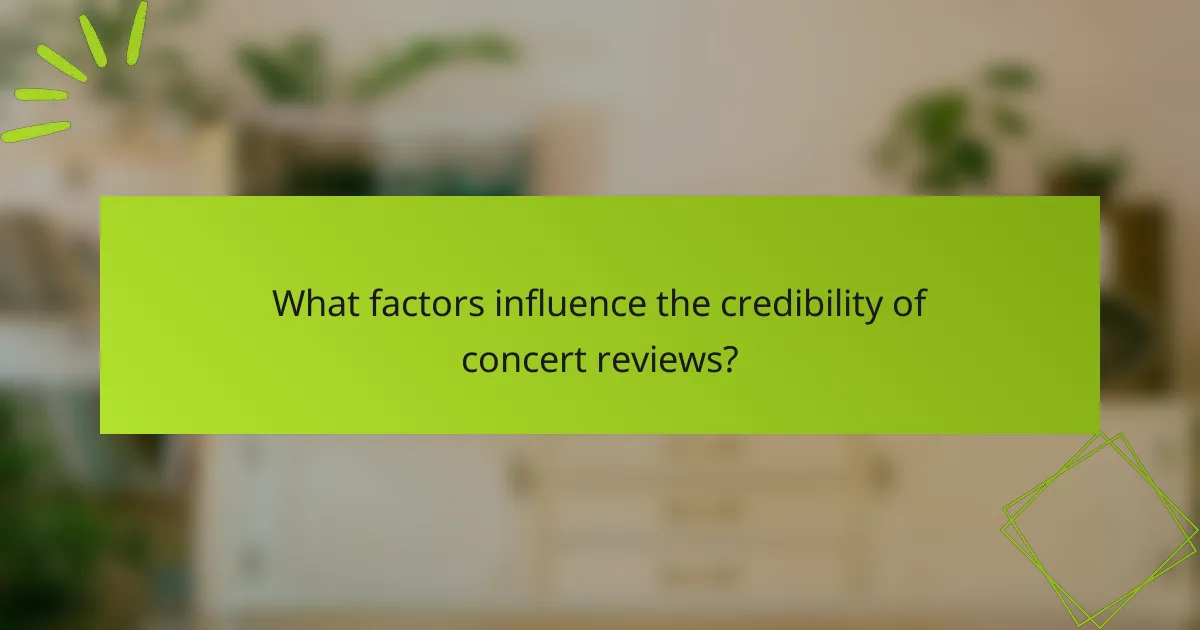
What factors influence the credibility of concert reviews?
The credibility of concert reviews is influenced by several key factors, including the reviewer’s reputation, the depth of their analysis, and the level of audience engagement. Each of these elements contributes to how readers perceive the authenticity and reliability of the review.
Reputation of the reviewer
A reviewer’s reputation plays a significant role in establishing credibility. Established critics from major publications often have a history of expertise and a recognized voice in the industry, which can lend weight to their opinions. In contrast, independent bloggers may lack this formal recognition but can still build credibility through consistent, honest reviews.
Readers often check the reviewer’s background, including their previous work and affiliations. A reviewer with a track record of insightful commentary or industry connections can enhance the perceived reliability of their reviews.
Depth of analysis and detail
The depth of analysis in a concert review is crucial for credibility. Reviews that provide detailed descriptions of the performance, including aspects like setlist choices, vocal performance, and stage presence, tend to resonate more with readers. A thorough analysis helps paint a vivid picture of the concert experience, allowing readers to understand the reviewer’s perspective better.
For example, a review that discusses the emotional impact of a particular song or the dynamics between band members offers more value than a superficial summary. Critics should aim for a balance between personal opinion and objective observations to enhance their reviews’ credibility.
Audience feedback and engagement
Audience feedback significantly impacts the credibility of concert reviews. Reviews that encourage reader interaction, such as comments or social media discussions, can create a sense of community and shared experience. This engagement allows readers to express their opinions and share their concert experiences, which can validate or challenge the reviewer’s perspective.
Additionally, reviews that reference audience reactions during the concert, such as crowd energy or participation, can enhance the review’s authenticity. Critics should consider incorporating these elements to foster a more engaging and credible review experience.
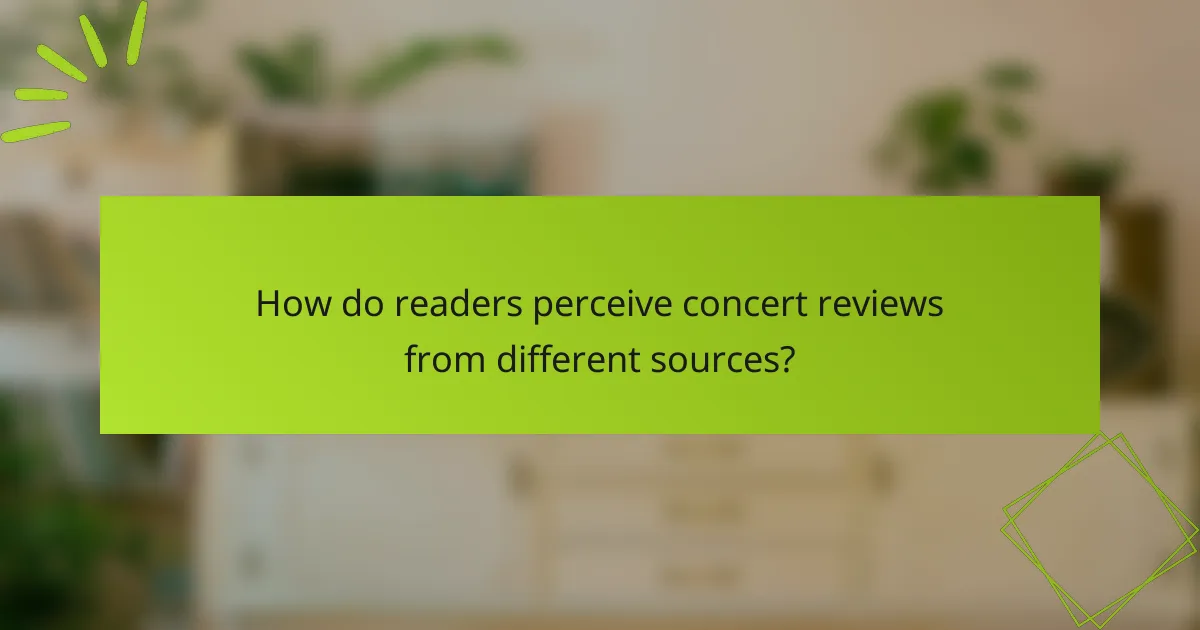
How do readers perceive concert reviews from different sources?
Readers often view concert reviews from established publications as more credible compared to those from independent bloggers, yet personal experiences shared by bloggers can resonate deeply with audiences. The perception of concert reviews is influenced by factors such as trust in brand reputation, the authenticity of personal narratives, and the role of social media in shaping opinions.
Trust in established brands
Established publications typically have a long-standing reputation that fosters trust among readers. This trust is built on consistent quality, professional standards, and editorial oversight, which can lead audiences to feel more confident in the accuracy of the reviews. For example, a review from a well-known music magazine may be perceived as more reliable than one from a lesser-known blog.
However, this trust can vary by genre and audience. Fans of niche music styles may prefer reviews from specialized blogs that cater specifically to their interests, even if those sources lack the broad recognition of major publications.
Value of personal experiences
Independent bloggers often share personal experiences that can create a sense of connection with readers. These narratives can be more relatable and engaging, as they reflect genuine emotions and unique perspectives on live performances. For instance, a blogger recounting their first concert experience may evoke nostalgia and resonate more with readers than a formal review.
While personal stories can enhance relatability, they may lack the objectivity and depth of analysis found in professional reviews. Readers should consider the balance between emotional engagement and critical insight when evaluating different sources.
Impact of social media on perception
Social media platforms significantly influence how concert reviews are perceived. Reviews shared on platforms like Twitter or Instagram can quickly reach a wide audience, allowing for immediate feedback and interaction. This immediacy can enhance the perceived relevance of a review, as readers often value real-time opinions from fellow concertgoers.
However, the informal nature of social media can lead to the spread of misinformation or overly biased opinions. Readers should be cautious and seek out multiple perspectives before forming an opinion based solely on social media posts, as these may not always reflect a comprehensive view of the concert experience.
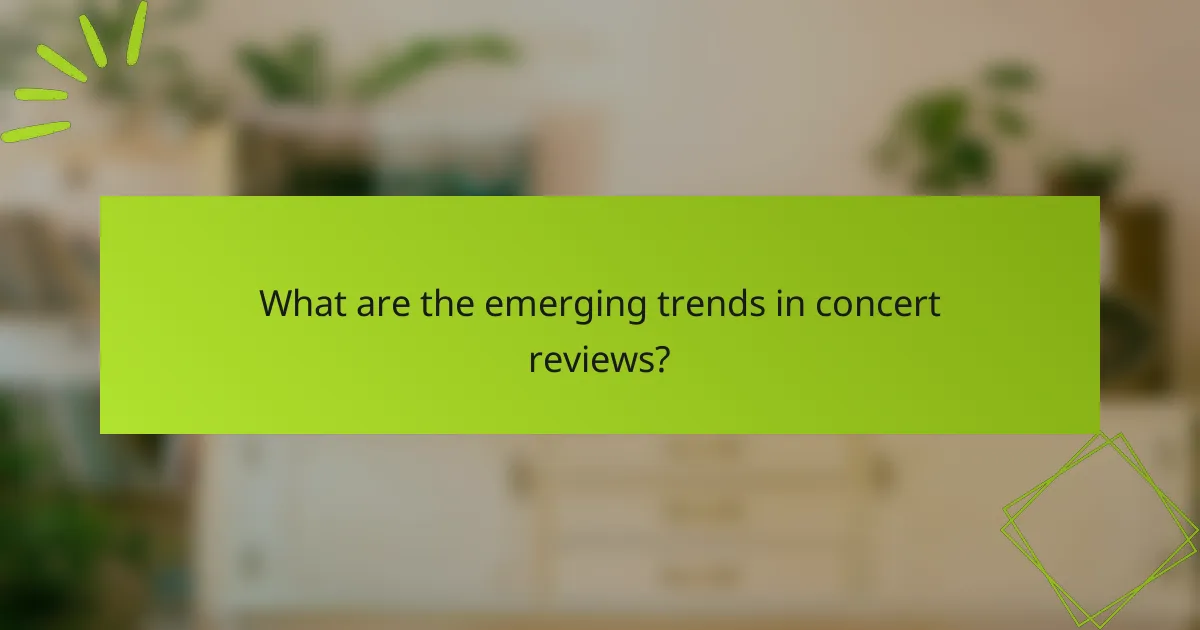
What are the emerging trends in concert reviews?
Emerging trends in concert reviews highlight the increasing influence of technology and audience engagement. Reviewers are now integrating various formats and platforms to enhance the storytelling aspect of live performances.
Integration of multimedia content
The integration of multimedia content in concert reviews allows for a richer and more immersive experience. Reviewers are using photos, videos, and audio clips to complement their written observations, providing a multi-sensory perspective on the performance.
For instance, a review might include a short video clip of a standout performance or a gallery of high-quality images from the concert. This not only captures the atmosphere but also engages readers who may prefer visual content over text.
When incorporating multimedia, ensure that the content is relevant and enhances the review. Avoid overwhelming readers with excessive media; instead, select a few impactful pieces that highlight key moments from the concert.
